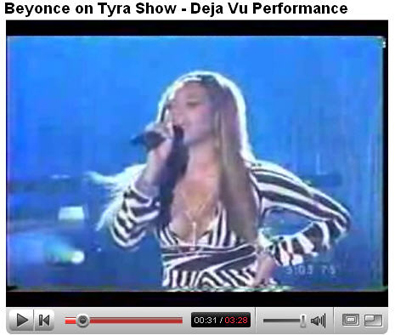Here's how a post-lawsuit YouTube will work


We're picking up conflicting signals on just what the copyright cartel would like to do with YouTube.
Universal Music Group sounds like they are going to sue YouTube for copyright infringement- sooner rather than later.
But just today, Warner Music announced a distribution and licensing deal with YouTube.
It sounds as though those two companies are going in opposite directions, but not really.
I believe the common thread here is that major multimedia copyright holders see YouTube as an ideal promotional and distribution platform, but one which must be co-opted to prevent copyright abuse.
Perhaps they are nervous about YouTube clips such as the one I have screencapped at the top of this post. That's a YouTube clip of pop star Beyonce singing a copyrighted song on the Tyra Banks show- which is also copyrighted.
Some have suggested that YouTube will wind up like "the old" Napster- sued into oblivion, to emerge later with a licensed model.
But as Mark Cuban-whose old Broadcast.com set the tone for licensed streaming of copyrighted music- writes on his blog today, detecting and prosecuting possibly infringing content on YouTube is quite different from the way such sleuthing was done on Napster (and Kazaa, for that matter).
Paraphrasing Mark, he points out that in many cases, flagging infringing content on YouTube can be made more difficult when that infringing work is in a content container within non-infringing work.
Say, for example, you put up a YouTube clip of your band practice. And that clip contains your performance of a copyrighted song. If you don't have any tags or other identifiable material in your You Tube clip information associated with that particular selection, how can this infringement be detected?
Well, copyright holders hate uncertaintly, and their lawyers are beholden to them.
That's why there's bound to be lawsuits. But what then?
After everything settles, I envision one of two scenarios: neither of which are mutually exclusive:
YouTube gets acquired, and goes to a proprietary, licensed-driven model with an open submission model available for non-copyrighted works;
Or more likely:
You Tube converts to to a submission-fee model where content contributors pay a fee to submit any material. This fee could be per-submission, or be assessed at an incremental- escalating, rate tied to the number of clips submitted, or to their total length. Example= you get 30 minutes of submission run time per month for a set fee..more than 30 minutes cost you a bit more.
This fee would have to be assessed for both copyrighted and non-copyrighted works.
A percentage of this fee would go to copyright holder organizations (BMI, ASCAP, etc.) for distribution into a general fund for members. Another portion of this fee could also go directly to YouTube for server-related expenses.
Do you think I have an idea here?